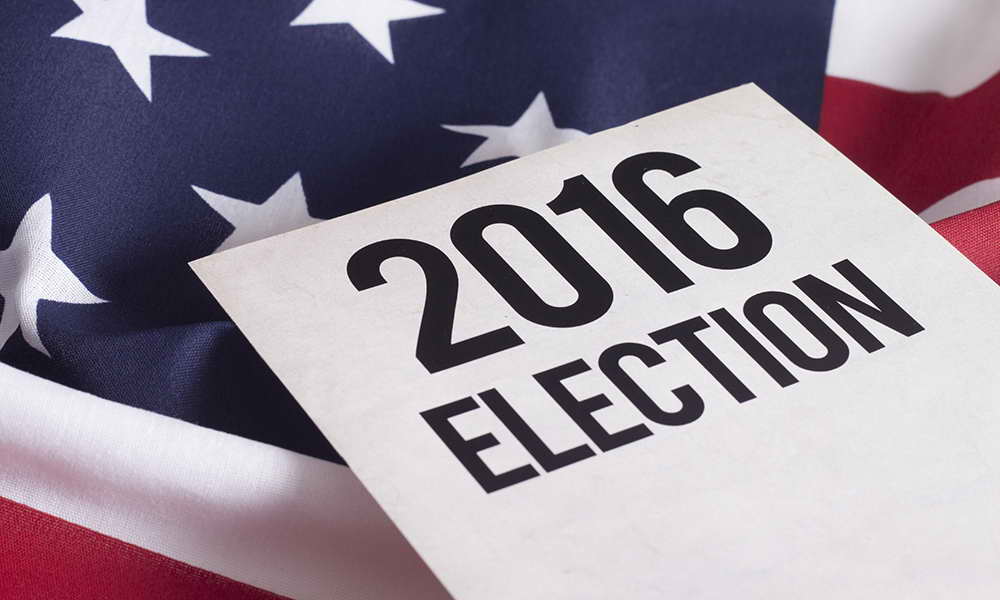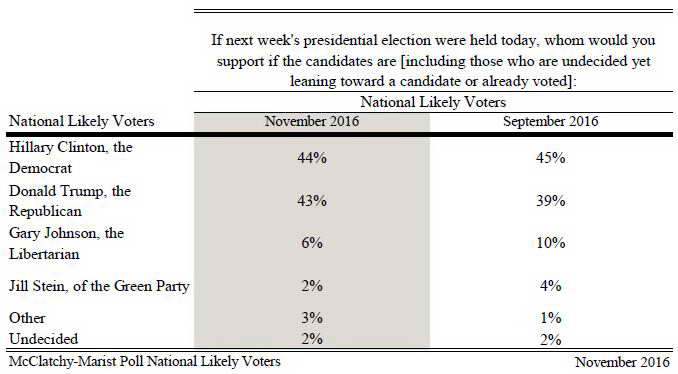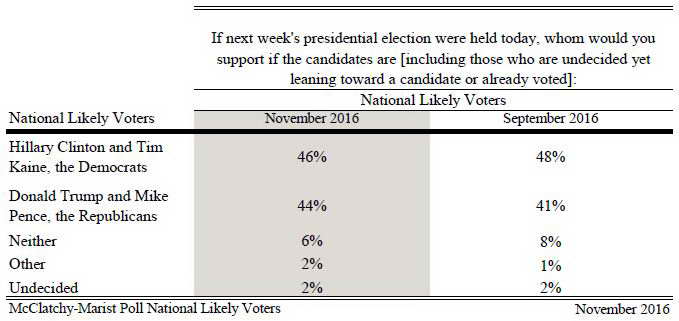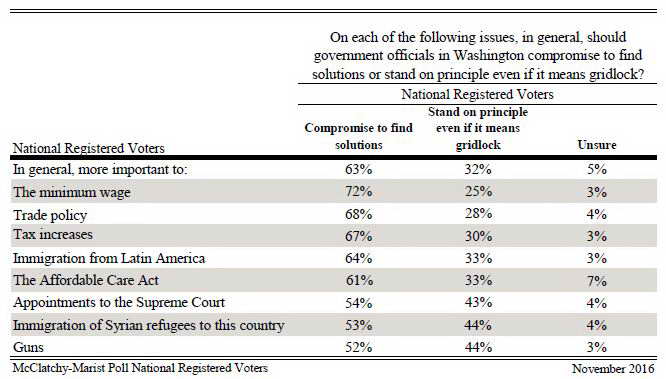November 5, 2016
11/5: Clinton and Trump Close Nationally
McClatchy/Marist National Poll
Going into this last weekend before Election Day, Democrat Hillary Clinton, 44%, and Republican Donald Trump, 43%, are in a fierce battle among likely voters nationally including those who are undecided yet leaning toward a candidate or who have already voted. Libertarian candidate Gary Johnson has the support of 6%, and Jill Stein of the Green Party garners 2%. Three percent support another candidate, and 2% are undecided.
When the McClatchy-Marist Poll last reported this question in September, Clinton was ahead of Trump by 6 points, 45% to 39%, among likely voters nationally. Johnson had 10%, and Stein received 4%. One percent, at that time, supported another candidate, and 2% were undecided.
“Although Clinton and Trump are separated by the slimmest of margins, the Electoral College can present a very different picture,” says Dr. Lee M. Miringoff, Director of The Marist College Institute for Public Opinion. “Close popular votes can, but do not necessarily, translate into tight battles for 270 electoral votes.”
Clinton, 50%, leads Trump, 42%, among those who have already voted. However, Trump edges Clinton, 44% to 40%, among those who have not yet voted.
“Right now, the campaigns are moving past trying to attract an early vote,” says Dr. Lee M. Miringoff, Director of The Marist College Institute for Public Opinion. “Barring any November surprises, the campaigns now turn to the GOTV effort to maximize turnout among their base supporters.”
Clinton, 89%, and Trump, 92%, retain the support of their party’s faithful. While Clinton’s support among Democrats is identical to the 89% she received in the previous survey, Trump’s support among Republicans is up from 86%. Among independents who are likely to vote, Trump, 39%, currently has an advantage over Clinton, 33%. Johnson receives 13% of independents likely to vote, and 5% are for Stein. In September, 34% of independents backed Clinton while 32% were for Trump. One in five independent likely voters, 20%, supported Johnson, and 8% were for Stein.
Trump, 49%, maintains a double-digit lead over Clinton, 37%, among likely voters who are white, similar to the 14-point lead he had in September. Of note, white voters comprise 71% of the likely electorate in this survey compared with the 72% who turned out in 2012. Among African Americans who are likely to vote, Clinton, 86%, continues to outdistance Trump, 7%. However, Clinton’s support among African American likely voters has dipped from 93%. Among Latinos likely to cast a ballot, Clinton, 49%, has a 15-point lead over Trump, 34%. Although this represents a significant decline since the previous poll, the sample size in this survey of Latinos who are likely to vote is small, and the margin of error is plus or minus 11 percentage points.
Among white likely voters without a college degree, Trump has a 30-point lead over Clinton, 57% to 27%. This is similar to his previous 27-point advantage among this voting group last time. Among white likely voters with a college degree, Clinton, 50%, has a double-digit lead over Trump, 40%. In September, Clinton and Trump were competitive, 43% to 41%, among this voting bloc.
A gender gap exists, but Clinton’s lead among women has declined. Clinton, 48%, currently has an 11-point lead over Trump, 37%, among women, down from 23 points earlier in the fall. Among men likely to vote, 50% support Trump to 38% for Clinton. Previously, Trump, 47%, was ahead of Clinton, 32%, by 15 points among men.
Among registered voters, Clinton receives 43% to 42% for Trump. Seven percent support Johnson, and 2% are for Stein. Four percent back another candidate, and 3% are undecided.
Looking at the two-way contest between just Clinton and Trump, only 2 points separate Clinton, 46%, and Trump, 44%, among likely voters nationwide including those who are undecided yet leaning toward a candidate or who have already voted. Six percent do not support either Clinton or Trump, 2% back another candidate, and 2% are undecided. Among likely voters with a candidate preference, 66% say they strongly support their candidate. 68% of Clinton’s backers and 69% of Trump’s supporters report they are firmly committed to their selection for president.
Neither Clinton nor Trump is well-liked by the national likely electorate, but Clinton fares slightly better than Trump. Clinton’s net negative is 17 points, unchanged from the 17-point net negative she received in September. 40% currently have a positive opinion of her while 57% do not. Trump’s net negative score is 25 points, comparable to the 24-point net negative he previously had. 36% currently have a favorable view of Trump while 61% have an unfavorable one.
The campaigns of both Clinton and Trump have been plagued by scandalous accusations. However, likely voters are more inclined to consider Clinton to have done something illegal than Trump. A majority of likely voters, 51%, report Clinton has done something illegal, including 87% of Republicans and 57% of independents. 32% of likely voters think she has done something unethical but not illegal. 14% of likely voters say she has done nothing wrong, and 3% are unsure. In contrast, 26% of the likely electorate believe Trump has done something illegal. But, 53% of likely voters say he has done something unethical, including majorities of Republicans, 58%, and independents, 57%. 17% report he has done nothing wrong, and 4% are unsure.
Will these accusations impact voters’ decisions at the polls? 39% say the controversy surrounding Clinton will make a major difference to their vote, including 70% of Republicans. 22% report the scandals will make some difference, and 38% say it will not affect their vote. 66% of Democrats report these allegations will not make any difference to their vote.
On Trump’s side of the equation, 33% of likely voters say the scandalous questions surrounding his candidacy will have a major effect on their vote. This includes 58% of Democrats but only 8% of Republicans. 22% think it will have some effect on their vote. 45% assert these allegations will not have any impact on their decision, including 70% of Republicans and 41% of independents.
Likely voters perceive the stakes of this election to be sky high. More than eight in ten likely voters, 81%, think it makes a big difference whether Clinton or Trump is elected. 12% believe it makes some difference, and 5% report it makes no difference at all. Two percent are unsure. There has been little change on this question since the McClatchy-Marist Poll last reported it in September.
Do voters think the election is rigged? A majority of likely voters, 56%, do not believe the election is rigged. However, about one in three, 33%, perceive the presidential contest to be rigged in Clinton’s favor. Only 4% say it is rigged in Trump’s favor, and 7% are unsure. 80% of Democrats, compared with 34% of Republicans, do not think the fix is in. While 60% of Republicans think the election is rigged to benefit Clinton, only 7% of Democrats assert the election is rigged in Trump’s favor. A majority of independent likely voters, 54%, do not think the election is fixed, but a notable 33% say it is rigged in Clinton’s favor.
There has also been discussion about the possibility of voter intimidation to prevent legitimate voters from participating on Election Day. And, a majority of likely voters, 56%, think there will be many attempts, 20%, or some attempts, 36%, to obstruct the voting process. Nearly four in ten, 37%, say there will be few, 12%, or no attempts, 25%, to intimidate voters. Seven percent are unsure.
Despite who emerges victorious on Election Night, more than three in four likely voters, 77%, think it is important that the losing candidate publicly acknowledge the winner as the legitimate president-elect. 20% do not think a concession is important, and 4% are unsure. Democrats, 89%, are more likely than Republicans, 66%, to say that it is critical that the losing candidate accept the winner as president-elect. 73% of independents agree.
If the losing candidate chooses to not publicly acknowledge the winner as the legitimate president-elect, 87% of likely voters nationally think the winner can move on as the next president. Only 8% of likely voters disagree. There is bipartisan consensus on this question. 90% of Democrats and 83% of Republicans say the winner should begin the transition process even if his or her opponent does not publicly concede the race. 86% of independents also have this opinion.
Turning to the U.S. Congress, 48% of likely voters say they support the Democrat in their district while 47% say they back the Republican. Three percent do not support either, and 2% are undecided. When this question was previously reported, likely voters favored the Democratic candidate over the Republican candidate, 49% to 45%. Two percent, at that time, did not support either candidate, and 3% were undecided.
“Senate and congressional races are contests in their own right, but a generic score like this suggests limited gains for either party in Congress,” says Dr. Lee M. Miringoff, Director of The Marist College Institute for Public Opinion. “Right now, this does not have the makings of a wave election.”
More than six in ten registered voters nationally, 63%, think it is more important for government officials in Washington to compromise to find solutions while 32% say it is more important that they stand on principle even if it means gridlock. Five percent are unsure. Democrats, 75%, and independents, 63%, are more likely than Republicans, 51%, to believe compromise outweighs a principled stance on the issues.
Regardless of the specific issue, a majority of registered voters nationally value compromise over gridlock. However, a deep partisan divide exists. When it comes to the Affordable Care Act, immigration policy toward Syrian refugees, guns, and Supreme Court appointments, at least seven in ten Democrats say compromise is key. In contrast, at least a majority of Republicans assert a principled stand must be taken on these issues. When it comes to immigration from Latin America and tax increases, eight in ten Democrats cite compromise while there is little consensus among Republicans. Democrats and Republicans both say it is more important to compromise than take a firm position when addressing the minimum wage and trade policy, but Democrats are more likely than Republicans to have this view.
Turning to President Barack Obama’s job approval rating, 51% of registered voters approve of how the president is performing in office. 44% disapprove, and 4% are unsure. There has been little change on this question since September when 52% of registered voters approved of how the president was doing his job. 43% disapproved, and 5% were unsure.
Americans remain pessimistic about the direction of the nation. 59% of adults nationally think the country is moving in the wrong direction, including 90% of Republicans and 67% of independents. 33% believe it is moving in the right one, including 60% of Democrats. Eight percent of Americans are unsure.
Complete November 5, 2016 McClatchy-Marist Poll Release of the United States
Complete November 5, 2016 McClatchy-Marist Poll of the United States (Tables of Likely Voters)
Post-election battles likely as Trump supporters in no mood for compromise






